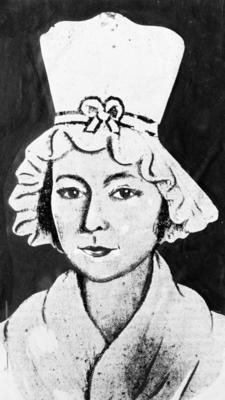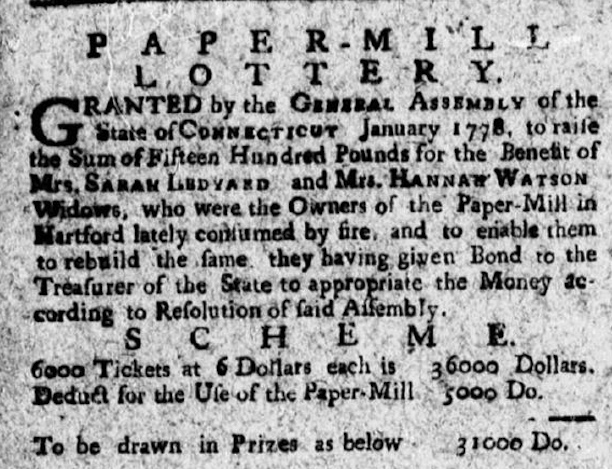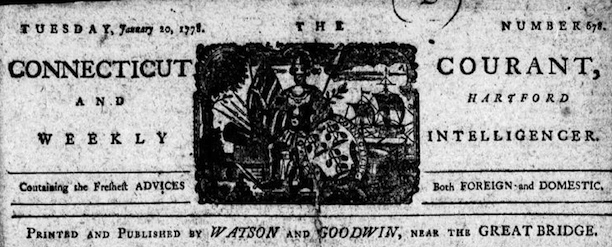By Elizabeth Correia
Hannah Bunce Watson was the publisher of the Connecticut Courant (now called the Hartford Courant) between 1777 and 1779. As a widow, Watson inherited the Connecticut Courant from her late husband, Ebenezer, and operated it until she married Barzillai Hudson in 1779. She used the paper to spread news on the American Revolution across the 13 colonies, while possessing little business experience, being a mother of five, and overcoming a devastating fire at the company’s paper mill that threatened to close down her entire operation. Hannah Watson’s articles called for support of the patriot cause and defiantly aided her country’s search for liberty, earning her a place in the Connecticut Journalism Hall of Fame and the Connecticut Women’s Hall of Fame.

When her husband Ebenezer died, Hannah Bunce Watson took over the Courant, becoming one of the first women publishers in the country – CT Women’s Hall of Fame. Used through Public Domain.
Early Life in Lebanon
Hannah was born on December 28, 1749, in Lebanon, Connecticut, to Aaron and Jerusha Bunce. After the death of her first husband, she married Ebenezer Watson on August 1, 1771. Ebenezer was the publisher of the Connecticut Courant newspaper at his shop on Main Street in Hartford. The paper became popular during the Revolutionary War by boosting morale among patriots with stories of their successes alongside those of British failures. When Ebenezer Watson died (due to smallpox) on September 16, 1777, the paper needed new leadership.
George Goodwin, the printer that served under Ebenezer Watson and worked at the Courant since 1766 (when he was nine years old), stepped in to take over operations. While Goodwin had sufficient training in working with printing machines, it soon became clear that he did not have the financial skills to maintain the Courant alone.
Hannah Watson’s Connecticut Courant
At the age of 27 Hannah Watson had no experience with production of the Courant and had five young children (all under seven years old) to take care of, but decided to partner with George Goodwin. On January 13, 1778, the Courant began printing a new heading that read: “Printed by WATSON and GOODWIN, near the GREAT-BRIDGE.” Watson decided what articles to publish, and also wrote some herself—the first being her husband’s obituary, which read:
On Tuesday last departed this life after a distressing sickness, Mr. Ebenezer Watson, Printer, in the 34th year of his age. A gentleman of a most humane heart, and susceptible of the tenderest feelings for distress, in whatever manner discovered — Jealous of the rights of human nature, and anxious for the safety of his country, his press hath been devoted to the vindication of rational liberty. The Governor’s company of Cadets, of which he was an Ensign, in token of respect for the deceased, attended the funeral in their uniforms. He has left a melancholy widow, with five young children, and a numerous circle of friends to lament his death.
Despite her noble intentions, Watson quickly ran into problems. She did not know anything about the paper’s subscribers and creditors and had to rely on Goodwin and also on Barzillai Hudson (a next-door neighbor who assisted Ebenezer in the past) for help. Then, shortly after she took command of the Courant, the paper mill in Manchester (that Watson now owned in partnership with Sarah Ledyard) burned to the ground. The total loss came to $5,000. Watson suspected that Tory sympathizers or prisoners of war on parole set it on fire in protest of the Courant’s promotion of liberty in the colonies. Shortly after, Watson and Goodwin released a statement that the Courant intended to print its last issue on February 3, 1778.

Detail from an announcement of the Paper-Mill Lottery in The Connecticut Courant, February 10, 1778. – Library of Congress, Electronic journals and Newspapers. Used through Public Domain.
In desperation, Watson and Sarah Ledyard appealed to the Connecticut Assembly who, within hours, agreed to hold a statewide lottery to raise money for a new mill and also commissioned three men to run it. During the four months of construction, the Courant printed half-sheet editions—newspapers made of one page printed on front and back—using wrapping paper, and never missed an issue.
Watson continued to publish patriotic articles, just as Ebenezer did, providing descriptions of battles from across the colonies, news on events in England (including Parliamentary proceedings), and editorials that called for colonists to support the Revolution. Watson also made the Courant her own. She added articles on moral and religious movements of the time (promoting temperance and cleanliness) along with news regarding scientific and geographic discoveries. She also limited advertising and local articles to make room for more patriotic news.
Life after the Courant
Then in March of 1779 the Courant’s header changed once again after Hannah married Barzillai Hudson. The Courant reported, “The late partnership between WATSON and GOODWIN is now dissolved and the printing business in all its branches will be carried out by HUDSON and GOODWIN.” Immediately the paper became more conservative; articles on social movements left its pages and the patriotic fervor of the Watsons also disappeared.

The Connecticut Courant and Weekly Intelligencer header under Barzillai Hudson, March 2, 1779. – Library of Congress, Electronic journals and Newspapers. Used through Public Domain.
Meanwhile, Hannah raised the five youngsters from her previous marriage, along with Hudson’s two children. Then, between the years of 1780 and 1793, she had four more children, though the youngest died at age three. Fourteen years later, on September 27, 1807, Hannah died of the flu. There is no mention of Hannah’s 16-month service to the Connecticut Courant and the American Revolution in her short obituary: “Died in this city, on Sunday last, Mrs. Hannah Hudson, wife of Mr. Barzillai Hudson, senior editor of this paper, aged 58 years.” She is now buried in the Old South Burying Ground in Hartford, Connecticut, beside Barzillai Hudson.
The Connecticut Women’s Hall of Fame made Hannah Bunce Watson an inductee in 1994 and the Connecticut Journalism Hall of Fame did likewise in 2011, recognizing Hannah as one of the first women publishers in America. Both organizations commemorate Hannah’s ability to keep Connecticut informed of world news important to the patriot cause. Using the Courant to support the American Revolution, she aided Connecticut’s transformation from an English colony to a U.S. state.
Elizabeth Correia authored this article while an undergraduate student studying anthropology at Central Connecticut State University.









